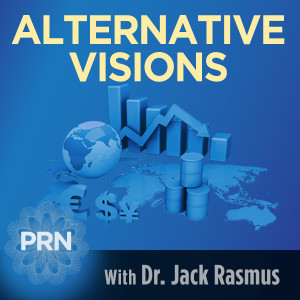
Today’s show is dedicated to dissecting the just released US first report on 2023 GDP by the Commerce Dept. Dr. Rasmus breaks down the various contributing elements to US GDP (Consumption, Business Investment, Government Spending, and Net Exports) to identify where the changes in GDP in 2023 were strongest and weakest. Explained as well is how the methodology for estimating inflation (GDP deflator price index) serves to low ball price changes and in turn boost the real GDP number of 2.5% for 2023. The methodology behind the GDP deflator is explained, and compared to the CPI (Consumer Price Index) with its higher estimate of inflation. Rasmus explains how changes to definition of GDP a decade ago also artificially boosted real GDP. Consumer spending held up in 2023 due to record credit card spending, drawdowns of savings and a surge in auto buying. Meanwhile, serious negative trends in business spending on equipment and housing construction continued in 2023 offset by a surprise jump in business spending on structures like factories; imports slowed faster than exports, and a sharp increase in 2023 in government spending on defense and state and local government all contributed (along with the low inflation adjustment) to the somewhat unexpected 2.5% GDP rise in 2023. Dr. Rasmus concludes, however, that the weaknesses within GDP do not ensure a ‘soft landing’ in 2024, which forecasts are saying will grow only 1-1.25% with recession in the first half of the year.
More Episodes
 2024-05-20
2024-05-20
 798
798
 2024-05-07
2024-05-07
 612
612
 2024-04-05
2024-04-05
 861
861
 2024-03-18
2024-03-18
 684
684
 2024-02-29
2024-02-29
 689
689
 2024-02-19
2024-02-19
 706
706
 2024-02-09
2024-02-09
 827
827
 2024-01-02
2024-01-02
 834
834
Create your
podcast in
minutes
- Full-featured podcast site
- Unlimited storage and bandwidth
- Comprehensive podcast stats
- Distribute to Apple Podcasts, Spotify, and more
- Make money with your podcast
It is Free
- Privacy Policy
- Cookie Policy
- Terms of Use
- Consent Preferences
- Copyright © 2015-2024 Podbean.com





